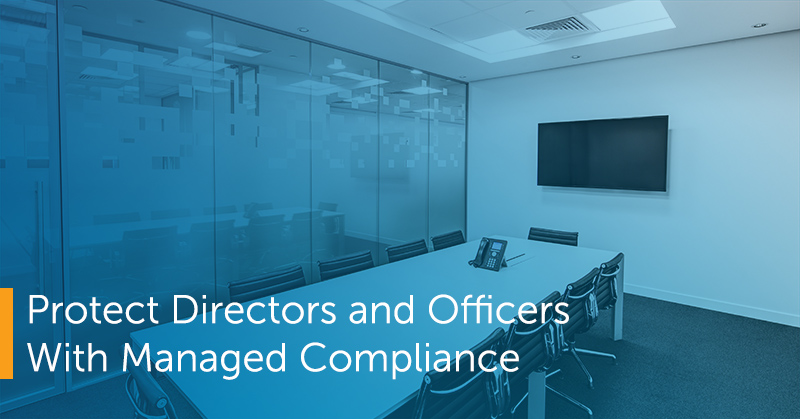-
Software
Compliance Software
Oversee licenses, track renewals, access documents, and more from a single interface.
Software Overview -
Services
Compliance Services
Full service compliance solutions for organizations throughout their entire lifecycles.
Services Overview -
Industries
-
Partner
- Information Center
Protect Board Members and Officers From Risks: Resources To Help You Manage Compliance

One of the key responsibilities of officers and board members is ensuring compliant operations. As a result, they have a duty to make a good faith effort to meet all of your regulatory requirements that apply to your activities and operating territory. For organizations without dedicated compliance teams, making sure you’ve covered all the bases can be daunting. Even a task as straightforward as filing annual reports is handled differently in each state, requiring a good deal of research for regional and national organizations.
What are some of the risks?
Failure to meet all of your requirements can expose your officers and directors to real risks, including personal liability for any resulting citations or penalties. In California, for example, nonprofit officers and directors may be held personally responsible for penalties levied for failure to meet state requirements, on the grounds that “use of charitable assets to pay avoidable penalties would constitute waste and misuse of charitable assets.”
Business and nonprofit executives face similar exposure if an entity falls out of good standing with the state. This can happen because of failure to file timely annual reports or maintain a registered agent. Once good standing is lost, your officers and directors may lose the legal protections of your corporation, becoming personally liable for lawsuits, debts, contractual obligations, penalties, and sometimes even criminal charges.
Businesses in regulated industries face further risk since they must maintain professional licenses as well as corporate good standing. In most states, unlicensed practice of a regulated profession carries potential criminal charges, which can void many of the contractual and legal protections that incorporation provides. Once again, officers and directors may find themselves held personally accountable for the business’s legal and financial obligations.
Steps to limit your risks
There are several steps you can take to limit risks and fulfill your organization’s duty of good faith compliance. The following list covers licensing and registration requirements that apply broadly to business and nonprofit operations. Depending on your specific industry and activities, there are many other aspects of compliance that may apply to your organization, such as insurance, financial, safety, and data privacy regulations, to name just a few.
Research your requirements
The following areas should be included in regulatory compliance due diligence and are linked to resources to help you get started.
Annual reports – These periodic reports keep secretaries of state updated on critical information about your operations. You can find complete filing instructions for every state in our Ultimate Guide and other resources featured on this page.
Tax registrations – Scroll to the “Tax Registration and Exemption” Section of our Information Center, where you’ll find instructions for managing state corporate income and privilege taxes, payroll taxes, sales and use taxes, S-Corp/C-Corp election, and nonprofit tax exemptions.
Registered agent – Explore the services and features you can expect from a reliable, professional registered agent.
Foreign qualification – Find out what it takes to enter new states.
Business licensing – Our white paper lays out the basic types of business licensing and when they are required. You can find additional information about our services here.
Fundraising registration – Find out where and when your nonprofit needs to register for fundraising, and how to meet the requirements.
In addition, our Business Startup Guide, Business Compliance Guide, Nonprofit Startup Guide, and Fundraising Compliance Guide are good starting points.
Invest in tools and resources to support your team
In addition to researching requirements, you can limit risk to your organization and your executive teams by having the right compliance tools and support in place. Dedicated compliance software is key to successful compliance, particularly for organizations operating in multiple states. Our state-of-the-art compliance software includes Entity Manager and License manager modules that let you manage corporate filings and good standing as well as business licenses, professional licenses, and state charitable solicitation registrations from one simple interface. The software is integrated with state databases to let you monitor good standing, licenses, and registrations in real time. Access corporate records, print custom reports, and share information seamlessly among your teams to ensure 24/7/365 compliance.
Invest in fully managed compliance
Given the complexity, the best way to ensure total compliance is to turn over the work to a specialist who manages the full range of state registration and reporting requirements in all 50 states. Our clients enjoy a dedicated account team for hands-on support as well as unlimited access to our compliance software for effortless oversight.
Learn more about our comprehensive entity management and licensing services for businesses as well as our support services for every phase of the nonprofit lifecycle. Contact our compliance team to get a complimentary compliance check, where we’ll review your status and recommend measures to eliminate risks.





